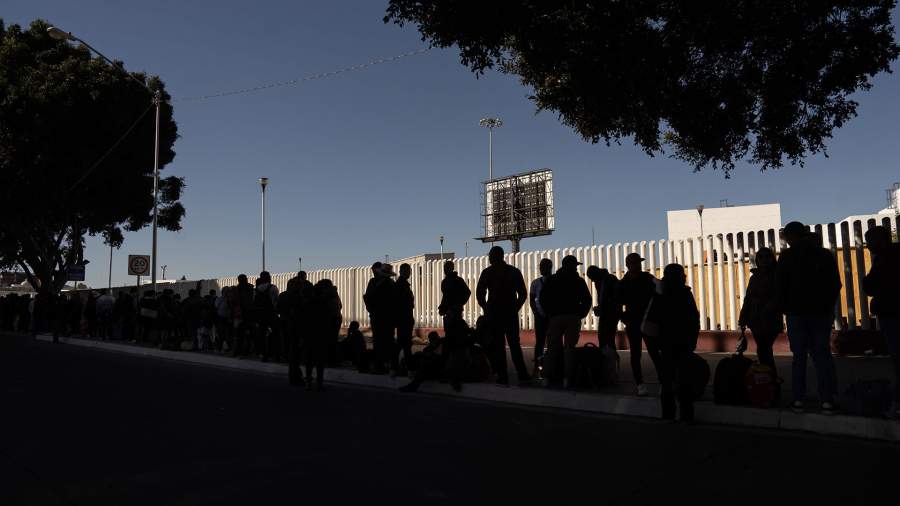State failure: more than 1.8 thousand Russians could not enter Mexico in 2024

Almost 2 thousand Russians were denied entry to Mexico in 2024. Russian Ambassador to the Latin American country Nikolay Sofinsky told Izvestia. The figures have slightly decreased compared to 2023, but still exceed the data of 2022. The U.S. migration crisis has made it difficult to enter Mexico, which serves as a transit point for those seeking asylum in the States. As a result, the number of travelers from the Russian Federation has become much smaller. Last year more than 33 thousand Russians visited Mexico, it is almost three times less than in 2022. About the latest trends in tourism to this country and relations with Mexico City under the new administration - in the material "Izvestia".
Why Russians are denied entry to Mexico
In 2024, more than 1.8 thousand Russians were denied entry into Mexico. This was told to "Izvestia" by the Russian Ambassador to the Latin American country Nikolai Sofinsky. Although the number of refusals was less than in 2023 (about 2.1 thousand), it still exceeds the figures of 2022 (1,043).
Refusals have become more frequent since February 2024. Most often it happened during transfers in Istanbul. By the way, it is still impossible to buy a Turkish Airlines ticket from Moscow to Mexico City with a connection in the Turkish metropolis. During the search for tickets for this direction, the site reports that there are no flights on the selected date and route.
In early December last year, Mexican Ambassador to Russia Eduardo Villegas Mejias met with representatives of 12 Russian tour operators to discuss the situation with refusals of entry to Russian citizens. At that time, joint efforts were made to develop recommendations for travelers from Russia, as well as to create a joint database with information from operators about their tour packages to Mexico. The diplomatic mission of the Latin American country also assured that they will keep in touch with the migration authorities of Mexico and the main partners serving Russian-speaking tourists in this country.
Nevertheless, the Russian embassy notes a decrease in the number of Russians who cross the Mexican border. In 2022, the country was visited by more than 91 thousand, in 2023 - 62 thousand, in 2024 - only about 33.5 thousand people. That is, the flow has almost halved over the year.
At the same time, the number of citizens on consular registration has increased, but very slightly - by 40 people (in 2023 - 2083, in 2024 - 2123), said the ambassador, noting that the consular registration is voluntary.
Russians began to travel less to Mexico because of three factors - the high cost of tours, the risk of being prevented from flying at passport control and the lack of opportunity to buy a single ticket from Turkish carriers, explained "Izvestia" vice president of the Association of Tour Operators of Russia (ATOR) on international tourism, CEO of tour operator Space Travel Artur Muradyan.
- Despite the meeting with the ambassador, there are no prerequisites for solving the situation. No explanations or guarantees were received as a result of the meeting," Muradyan said.
Russia-Mexico relations under the new administration
The difficulties faced by Russian tourists are largely related to illegal migration across the Mexico-U.S. border. The authorities of the Latin American state are taking appropriate measures to bring the situation under control.
It was with the topic of migration that the main claims of the future head of the White House Trump to Mexico were connected. Having been elected to the presidential post, the Republican immediately threatened Mexico City with 25 percent duties on imports, if the authorities fail to cope with the flow of illegal immigrants. By the way, Trump will officially become president on January 20.
- In the foreign policy arena, relations with the United States and Canada remain a priority for Mexico, especially given Donald Trump's return to the presidency. It is also important to revise the provisions of the T-MES treaty (trade agreement between the U.S., Canada and Mexico - Ed.), which plays a strategically important role for the Mexican economy, - said Ambassador Nikolay Sofinsky.
Against this backdrop, it is unlikely to expect a softening of the measures taken by the Mexican authorities at the border, especially given Trump's impulsiveness. But it's worth noting that Mexico has recently undergone a change of power. The embassy explains that the country is still in the process of establishing a new administration of Claudia Sheinbaum, who took over the presidency on October 1, 2024. But for now, the focus is on domestic policy issues, particularly sweeping constitutional reforms.
Late last year, both chambers of the Mexican Congress approved changes to two articles of the constitution, which will allow the authorities to implement, among other things, a controversial reform that calls for the election of judges at all levels. This is the latest legislative initiative proposed by former President Andres Manuel Lopez Obrador. Its discussion and adoption was accompanied by widespread protests. According to opponents of the reform, its implementation would politicize the judicial institution and put at risk the impartiality of judges and the fundamental freedoms of the rule of law.
Despite some turbulence in Mexican politics, the Russian side continues to engage with its Mexican partners on many issues.
- For our part, we are actively engaged with our Mexican partners on a wide range of bilateral issues. Contacts between specialized ministries and agencies are also continuing," said Nikolay Sofinsky.
One of the important aspects of Russian-Mexican cooperation is trade. Mexico is a major economy in the Latin American region and an important trading partner for the United States and Canada, but the country is also developing economic relations with Russia despite the threat of secondary sanctions. Trade turnover between the countries is showing strong growth. In the first four months of 2024, bilateral trade amounted to $759.99 million, which is 9.8% more than in the same period of 2023.
